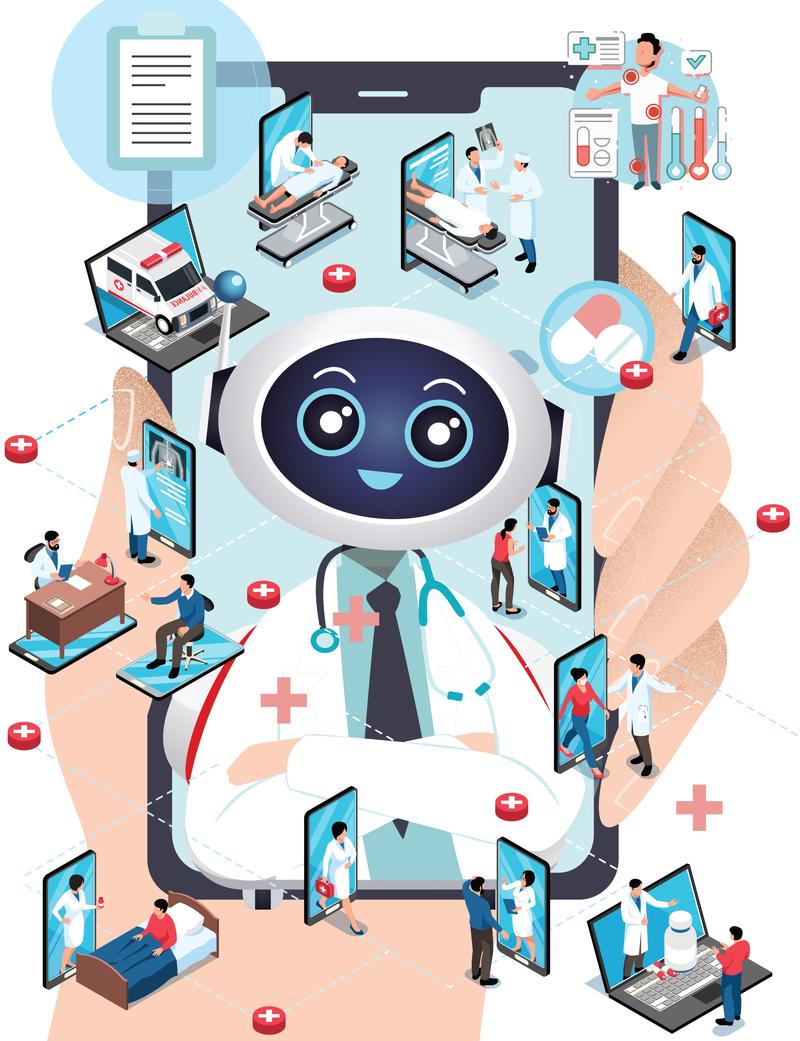
Smart technologies play a critical role in upgrading Hong Kong's public medical institutions and coping with a dire shortage of resources. He Shusi reports from Hong Kong.
Hong Kong's public hospitals are getting "smarter" with all the robotics, artificial intelligence and big data technologies to help deal with the densely populated city's finite medical resources.
Digitalizing and automating facilities in public hospitals has been a major task for the Hospital Authority — a statutory body that manages 43 government hospitals and institutions, as well as some 49 specialist outpatient, and more than 70 general outpatient clinics in the city. The vision is to transform 18 major public hospitals with accident and emergency services into smart ones by 2024.
Currently, the average waiting time for treatment at the accident and emergency departments exceeds an hour, and some may take more than six hours.
The HA will launch pilot programs in some of the hospitals to develop smart wards and clinics, Chairman Henry Fan Hung-ling said last year. "We believe smart hospitals will make healthcare services more efficient and convenient for patients and their families," he said.
The authority will strengthen information technology systems to streamline workflow and enhance efficiency, modernize public hospitals and promote sustainability to cope with growing demand.
Joanna Pang, HA's chief manager of the information technology and health informatics division, said the smart vision covers patient care, medical employees' work procedure, logistics, management, infrastructure and facilities.
She said real-time information about the hospitals' overall operations, such as the number of beds and medical employees available, particularly in a major public emergency, is important.
Recalling a fatal bus crash in Tseung Kwan O in 2009, in which dozens of people were injured, Pang said it was difficult to distribute medical resources to treat all the injured in time as the HA did not have the real-time operating information on public hospitals, such as the availability of beds and medical personnel, or how crowded the accident and emergency units were.
Two passengers were killed and 34 others were injured in the accident when a vehicle turned on its side.
So far, most of the city's smart pilot programs have been implemented at Tseung Kwan O Hospital and Tin Shui Wai Hospital. Both hospitals are relatively new, making it easier for new technologies and smart facilities to be applied.
Obstacles of application
"One of the biggest challenges in developing smart hospitals in Hong Kong is that many of our public hospitals were built decades ago. Some of the equipment and infrastructure has to be upgraded, while others may need a complete refurbishment," said Pang.
Smart technologies used at the two hospitals include the system for digital management of accident and emergency departments, digital records for inpatients, robotics for logistics delivery, food delivery for inpatients, and ward patrol.
Robots don't get tired and help to free medical employees of more intellectually demanding work, she said.
The shortage of manpower in Hong Kong's public healthcare system is acute. According to Secretary for Food and Health Sophia Chan Siu-chee, the city will be short of 1,610 doctors and more than 3,600 general nurses by 2030, lagging developed economies such as France, the United Kingdom and Singapore.
According to census projections, one-third of Hong Kong's population of over 7 million will be older than 65 in the next two decades. The coronavirus pandemic has raised the alarm that disinfection facilities are critical, such as in the operation and cleaning of isolation wards, Pang pointed out.
She said the advent of 5G has enabled limited application of remote surgery at Tseung Kwan O Hospital. While a doctor performs a surgery, another senior doctor can be involved in decision-making remotely through a video call when he or she is out of the hospital.
Philip Chiu Wai-yan, associate dean of the Faculty of Medicine with the Chinese University of Hong Kong, said how medical employees and patients cope with these changes is also vital to its success.
Importance of training
With smart technologies changing the previous procedures for medical personnel, it's important to train front-line workers well so that they'll feel comfortable with them and understand the potential risks, Chiu said.
"Every piece of smart technology must be suitable for both medical staff and patients. It can't be smart just for the sake of becoming smart."
Chiu, who's also director of endoscopy at Prince of Wales Hospital, noted that the institution is being upgraded to become smarter.
"The ultimate goal of smart hospital development is for the betterment of patients. Any changes made shouldn't be too complicated (for the patients)," he said.
"The role of the information and technology department cannot override that of the front-line workers. Anything smart must be designed on the premise of a full understanding of frontline practices."
